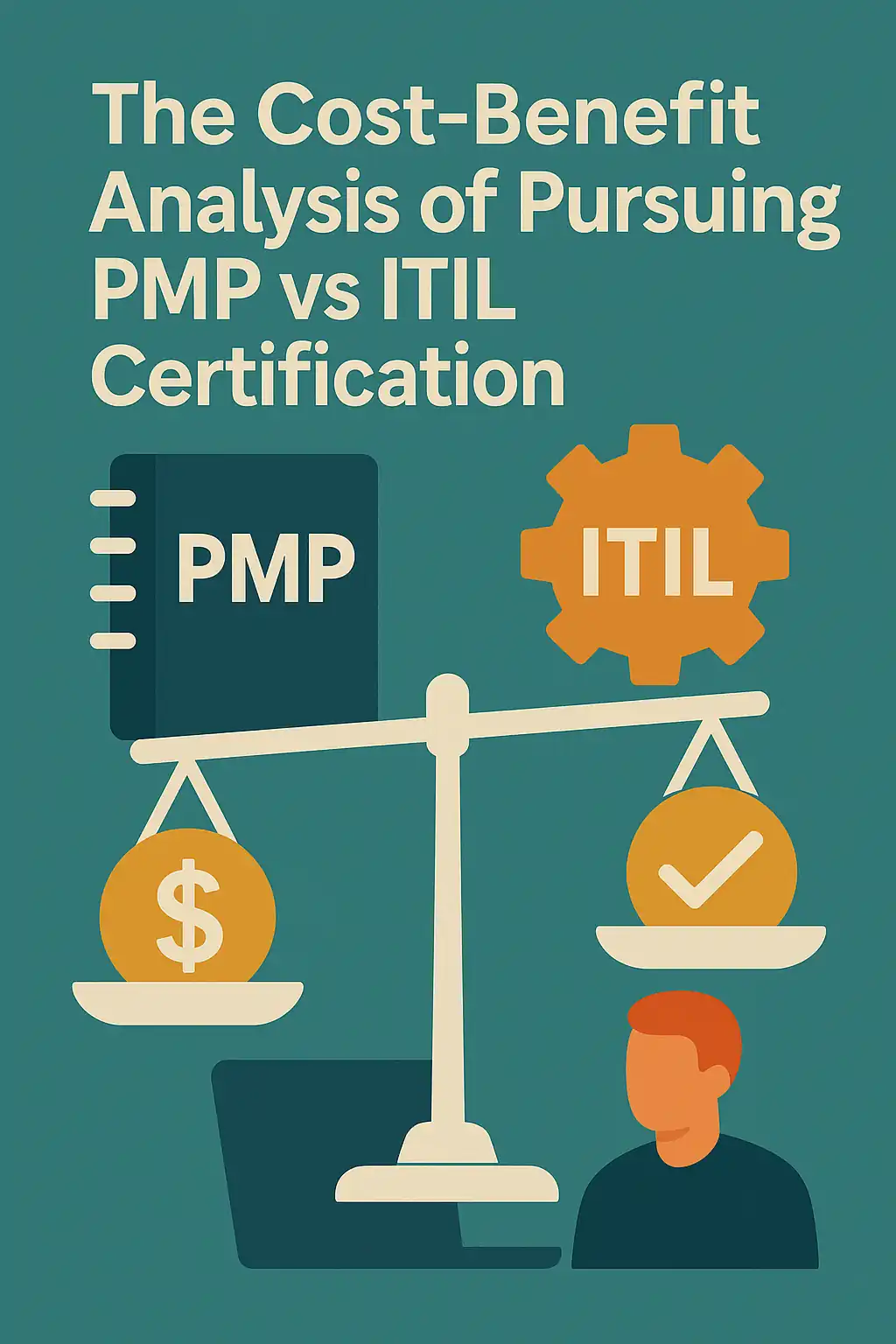Introduction
Professionals often find themselves at a crossroads when considering certifications that can enhance their careers. Two of the most recognized certifications in these fields are the Project Management Professional (PMP) and the Information Technology Infrastructure Library (ITIL). Each certification offers distinct advantages and focuses, making it essential for professionals to evaluate their options carefully.
Overview of PMP Certification
The PMP certification is a globally recognized credential that signifies a project manager’s expertise in leading and directing projects. It emphasizes clear project objectives, timelines, and resource management, which are crucial for successful project delivery. According to the 9th PMI wage study, PMP-qualified project managers earn approximately 20% more than their non-certified counterparts, highlighting the financial benefits of obtaining this certification [2]. Furthermore, PMP certification is associated with long-term career opportunities, making it a valuable investment for those looking to advance in project management [4].
Overview of ITIL Certification
On the other hand, ITIL certification focuses on best practices for IT service management, ensuring that IT services align with the needs of the business. ITIL provides a framework for continuous improvement and effective service delivery, which is increasingly important in today’s technology-driven environment. While ITIL certifications can lead to job opportunities, they are often associated with short-term contracts, which may not provide the same long-term career stability as PMP [4].
Importance of Certifications in Project Management and IT Service Management
Certifications like PMP and ITIL play a critical role in enhancing a professional’s credibility and skill set. They not only validate an individual’s knowledge and expertise but also demonstrate a commitment to professional development. In a competitive job market, having these certifications can set candidates apart and open doors to new opportunities.
Cost-Benefit Analysis as a Decision-Making Tool
When considering the pursuit of either certification, a cost-benefit analysis (CBA) serves as an essential tool for decision-making. This approach involves estimating the costs associated with obtaining the certification—such as exam fees, study materials, and time investment—and weighing them against the potential benefits, including increased earning potential, career advancement, and enhanced job security [6][10]. By conducting a thorough CBA, professionals can make informed decisions that align with their career goals and financial situations.
Understanding PMP Certification
The Project Management Professional (PMP) certification is a globally recognized credential offered by the Project Management Institute (PMI). It signifies that an individual possesses the knowledge, skills, and experience necessary to lead and direct projects effectively. The PMP certification is highly regarded in the field of project management, as it covers ten essential knowledge areas, including project integration, scope, time, cost, quality, human resources, communications, and more, making it a comprehensive qualification for project managers [1].
Costs Associated with PMP Certification
Pursuing PMP certification involves several costs that professionals should consider:
- Exam Fees: The cost of the PMP exam varies depending on whether you are a PMI member. As of now, the exam fee for PMI members is approximately $405, while non-members pay around $555. Membership can provide additional benefits, including access to resources and discounts on study materials [1].
- Study Materials: Candidates often invest in study guides, books, and online resources to prepare for the exam. The cost of these materials can range from $50 to several hundred dollars, depending on the quality and comprehensiveness of the resources chosen [1].
- Training Courses: Many candidates opt for formal training courses, which can be delivered in-person or online. These courses typically cost between $1,000 and $2,500, depending on the provider and the depth of the training [1].
Time Required for Preparation
The time commitment for obtaining PMP certification can vary significantly based on an individual’s prior knowledge and experience in project management. On average, candidates should expect to dedicate:
- Study Time: Most professionals spend between 100 to 200 hours preparing for the exam. This includes reviewing study materials, taking practice exams, and attending training sessions [1].
- Experience Requirements: To qualify for the PMP exam, candidates must have a certain level of project management experience. This typically includes 3 to 5 years of leading projects, depending on educational background, which adds to the overall time investment before one can even sit for the exam [1].
Benefits of PMP Certification
The benefits of obtaining a PMP certification are substantial and can significantly impact a professional’s career trajectory:
- Career Advancement: PMP certification is often a prerequisite for higher-level project management positions. It demonstrates a commitment to the profession and can open doors to new job opportunities [1].
- Salary Increase: According to various industry reports, PMP-certified professionals tend to earn higher salaries compared to their non-certified counterparts. The certification can lead to an average salary increase of 20% or more, depending on the industry and location [1].
- Professional Credibility: Holding a PMP certification enhances a professional’s credibility among peers and employers. It signals a standardized level of expertise and knowledge in project management practices, which can be particularly beneficial in competitive job markets [1].
Understanding ITIL Certification
ITIL (Information Technology Infrastructure Library) certification is a globally recognized framework that focuses on IT service management (ITSM). It provides best practices for aligning IT services with the needs of businesses and customers, making it highly relevant in today’s digital landscape. Organizations that adopt ITIL can manage risks more effectively, strengthen customer relations, and establish cost-effective practices, ultimately leading to improved service delivery and operational efficiency [1][8].
Costs Associated with ITIL Certification
The financial investment for ITIL certification can vary significantly based on several factors, including the training provider and the specific certification level pursued. Here are the key cost components:
- Exam Fees: The cost for the ITIL Foundation exam typically ranges from $300 to $400 [2]. For intermediate certifications, the overall price can range from $500 to $700, which includes multiple exams [3].
- Training Courses: Depending on the provider, training courses can add to the overall cost. These courses are essential for thorough preparation and can vary widely in price.
- Preparation Resources: Additional costs may include practice tests, exam vouchers, and study materials, which can further increase the total investment required for certification [7].
Time Commitment Required for ITIL Certification
Preparing for ITIL certification requires a significant time commitment. Candidates should expect to dedicate several weeks to months for study and preparation, depending on their prior knowledge and experience with IT service management. The ITIL Foundation exam requires a minimum score of 65%, which translates to 26 correct answers out of 40 [2]. Therefore, a structured study plan is crucial for success.
Benefits of ITIL Certification
Investing in ITIL certification can yield numerous benefits for professionals and organizations alike:
- Improved Service Delivery: ITIL emphasizes understanding customer needs and stakeholder requirements, leading to enhanced service quality and customer satisfaction [4].
- Enhanced Efficiency: By implementing ITIL practices, organizations can reduce IT upkeep costs and improve overall operational efficiency, which is vital for digital transformation initiatives [8].
- Career Opportunities: ITIL certification can open doors to various career advancement opportunities, as it is highly regarded in the IT industry. Professionals with ITIL certification often experience salary increases and greater job prospects [9].
Cost Comparison: PMP vs ITIL
When considering certifications in project management, professionals often weigh the financial and time investments required for each option. Two of the most recognized certifications are the Project Management Professional (PMP) and the Information Technology Infrastructure Library (ITIL). Below is a detailed breakdown of the costs associated with each certification, including direct and indirect expenses, as well as the long-term financial implications of pursuing these credentials.
PMP Certification:
- Training Costs: The cost for PMP training typically ranges from $1,000 to $2,000. This investment is crucial as it prepares candidates for the exam and fulfills the requirement of 35 Contact Hours of project management education [1][8].
- Exam Fees: The PMP exam fee is approximately $555 for non-PMI members and $405 for PMI members [3][8].
- Renewal Fees: After obtaining the certification, professionals must budget for renewal fees, which are around $150 every three years [8].
ITIL Certification:
- Training Costs: ITIL training costs can vary widely depending on the level of certification pursued (Foundation, Intermediate, etc.), but it generally ranges from $1,000 to $2,500 for comprehensive courses [1].
- Exam Fees: The exam fees for ITIL certifications also vary, with the Foundation level typically costing around $300 [1].
- Renewal Fees: ITIL certifications do not require renewal fees in the same way as PMP, but ongoing education may be necessary to stay current with best practices.
Consideration of Indirect Costs
In addition to the direct costs associated with each certification, professionals should consider the indirect costs that can impact their overall investment:
- Lost Income During Study: Time spent preparing for the PMP or ITIL exams can lead to lost income, especially if professionals take time off work to study. This can be particularly significant for those in demanding roles where project management skills are essential.
- Time Off Work: The time commitment for studying and attending training sessions can vary. For PMP, candidates need to accumulate a minimum of 36 months of project management experience (or 60 months with a high school diploma) before they can sit for the exam [1][5]. This requirement may necessitate additional time away from work to gain the necessary experience.
Long-Term Financial Implications
Investing in either PMP or ITIL certification can yield significant long-term financial benefits:
- PMP Certification: Professionals with PMP certification often see enhanced earning potential, with many reporting salary increases post-certification. The financial rewards can outweigh the initial investment, especially in industries that prioritize project management expertise [2][9].
- ITIL Certification: While ITIL may not directly correlate with salary increases as strongly as PMP, it can enhance career prospects in IT service management, leading to roles that may offer competitive salaries and job security in a growing field [1][6].
Time Investment Analysis: PMP vs ITIL
When considering certifications in project management, professionals often weigh the time commitments required for each option. The two prominent certifications, Project Management Professional (PMP) and Information Technology Infrastructure Library (ITIL), have distinct requirements that can significantly impact both personal and professional life. Below is a detailed analysis of the time investment needed for each certification and strategies for effective preparation.
Comparison of Study Hours Needed for PMP vs ITIL
- PMP Certification: Candidates typically need to dedicate around 2 months to prepare for the PMP exam, with an average of 3 hours of study each day. This totals approximately 180 hours of study time over the preparation period [5]. Additionally, candidates must complete 35 hours of project management education or hold a Certified Associate in Project Management (CAPM) certification before they can sit for the exam [6].
- ITIL Certification: The time commitment for ITIL can vary based on the specific level of certification pursued. Generally, ITIL Foundation certification may require less intensive study compared to PMP, often estimated at around 20-30 hours of study time. However, higher-level ITIL certifications, such as ITIL Intermediate, can demand more extensive preparation, potentially requiring 40-60 hours or more, depending on the candidate’s familiarity with the material.
Impact of Time Investment on Personal and Professional Life
The time invested in pursuing either certification can have significant implications:
- PMP: The rigorous study schedule and the necessity of gaining practical experience can lead to a demanding period for candidates. This commitment may require professionals to adjust their work-life balance, potentially impacting family time and personal commitments. However, the long-term benefits of obtaining a PMP certification, such as enhanced career opportunities and higher earning potential, can justify the initial time investment [7].
- ITIL: The relatively shorter preparation time for ITIL may allow professionals to balance their study with work and personal life more effectively. This flexibility can be particularly appealing for those already working in IT roles, as they can apply their learning directly to their job responsibilities. However, the perceived lower time commitment may also lead to a less thorough understanding of the material if not approached with the same seriousness as PMP preparation.
Strategies for Effective Time Management During Preparation
To maximize the effectiveness of study time for both PMP and ITIL certifications, professionals can employ several strategies:
- Create a Study Schedule: Establishing a structured study plan that allocates specific times for study sessions can help ensure consistent progress. Breaking down the material into manageable sections can make the process less overwhelming.
- Utilize Study Groups: Joining or forming study groups can provide motivation and accountability. Engaging with peers allows for the exchange of knowledge and can enhance understanding of complex topics.
- Incorporate Real-World Applications: Applying concepts learned during study sessions to real-world scenarios can reinforce understanding and retention. For PMP candidates, leveraging project management experiences can be particularly beneficial.
- Leverage Online Resources: Utilizing online courses, webinars, and practice exams can provide flexibility in learning and help candidates gauge their understanding of the material.
Return on Investment (ROI) Analysis
When considering certifications in project management, professionals often weigh the financial and time investments against the potential returns. Two prominent certifications in this field are the Project Management Professional (PMP) and the Information Technology Infrastructure Library (ITIL). This section will analyze the ROI of pursuing either certification, focusing on salary trends, job opportunities, networking benefits, and long-term career growth.
Salary Trends and Job Opportunities
- PMP Certification: The PMP certification is highly regarded in project management, often leading to significant salary increases. IT leaders recognize the value of certified staff, with many reporting that PMP-certified professionals can earn over $30,000 more annually compared to their non-certified counterparts [2]. The demand for project managers with PMP certification continues to grow, as organizations seek skilled individuals to lead complex projects effectively [1].
- ITIL Certification: While ITIL is more focused on IT service management, it also offers competitive salary prospects. ITIL-certified professionals are increasingly sought after in organizations that prioritize IT service delivery and management. The financial benefits of ITIL certification can be substantial, although they may not always match the higher salary brackets associated with PMP certification [3].
Value of Network and Community Access
- PMP Networking Opportunities: Obtaining a PMP certification opens doors to a vast network of professionals in project management. This community provides access to resources, mentorship, and job opportunities that can significantly enhance career prospects. Engaging with this network can lead to collaborations and insights that are invaluable for career advancement [4].
- ITIL Community Benefits: Similarly, ITIL certification connects professionals to a community focused on IT service management. This network can provide support, knowledge sharing, and potential job leads, particularly in organizations that emphasize ITIL practices. The collaborative environment fosters professional growth and can lead to new opportunities in the IT sector [3].
Long-Term Career Growth Prospects
- PMP Career Advancement: The PMP certification is associated with robust career growth. Professionals with this certification often find themselves in leadership roles, managing larger teams and more complex projects. The skills gained through PMP training not only enhance project management capabilities but also prepare individuals for higher-level positions within their organizations [4][5].
- ITIL Career Pathways: ITIL certification also offers pathways for career advancement, particularly in IT management roles. As organizations increasingly adopt ITIL frameworks, certified professionals can progress into senior positions that require a deep understanding of IT service management. This certification can lead to lucrative opportunities, especially as IT continues to evolve [7][10].
Case Studies and Testimonials
The decision to pursue either PMP (Project Management Professional) or ITIL (Information Technology Infrastructure Library) certification can significantly impact a professional’s career trajectory. Below are success stories and insights from individuals who have navigated this path, highlighting their experiences and the outcomes of their choices.
Success Stories from PMP Certified Professionals
- Increased Earning Potential: A PMP-certified project manager reported a 20% increase in salary compared to their non-certified peers, as indicated by the 9th PMI wage study. This financial boost not only improved their quality of life but also allowed for greater investment in personal development and further certifications [1].
- Career Advancement: Another professional shared that obtaining the PMP certification opened doors to leadership roles within their organization. They were able to lead larger projects and manage cross-functional teams, which enhanced their visibility and reputation in the industry. This individual emphasized that the rigorous training and knowledge gained through the PMP program equipped them with the skills necessary to tackle complex project challenges effectively.
- Networking Opportunities: A PMP holder highlighted the value of networking within the PMI community. They attended various PMI events and conferences, which led to valuable connections and job opportunities. This professional noted that the PMP certification not only validated their skills but also provided a platform for continuous learning and professional growth.
Success Stories from ITIL Certified Professionals
- Enhanced Service Delivery: An ITIL-certified professional working in IT service management shared how the certification helped them implement best practices that improved service delivery within their organization. By adopting ITIL frameworks, they were able to streamline processes, reduce downtime, and enhance customer satisfaction, ultimately leading to a more efficient operation.
- Career Transition: Another individual transitioned from a technical role to a managerial position after obtaining their ITIL certification. They found that the knowledge gained from ITIL principles allowed them to bridge the gap between technical teams and business objectives, making them a valuable asset to their organization. This transition not only increased their job satisfaction but also resulted in a significant salary increase.
- Organizational Impact: A case study from a large corporation revealed that after implementing ITIL practices, the organization saw a marked improvement in project success rates. The ITIL-certified professionals within the company played a crucial role in aligning IT services with business needs, demonstrating the certification’s value in driving organizational success.
Lessons Learned and Advice from Both Perspectives
- Invest in Continuous Learning: Both PMP and ITIL certified professionals emphasized the importance of ongoing education. They advised aspiring candidates to stay updated with industry trends and best practices, as this knowledge is crucial for maintaining relevance in a rapidly evolving field.
- Choose Based on Career Goals: Professionals suggested that individuals should align their certification choice with their career aspirations. For those aiming for project management roles, PMP may be more beneficial, while ITIL is ideal for those focused on IT service management and operational excellence.
- Networking is Key: Both groups highlighted the importance of networking. Engaging with peers and industry leaders can provide insights, mentorship, and opportunities that are invaluable for career advancement.
Conclusion
In evaluating the financial and time investments associated with pursuing PMP (Project Management Professional) and ITIL (Information Technology Infrastructure Library) certifications, several key points emerge that can guide professionals in making an informed decision.
- Cost Considerations: The PMP certification is associated with a significant salary benefit, with PMP-qualified project managers earning approximately 20% more than their non-certified counterparts, according to the 9th PMI wage study [2]. This financial advantage can justify the costs associated with obtaining the certification, which includes exam fees, study materials, and potential training courses. In contrast, while ITIL certifications can enhance career prospects, they often lead to short-term contract roles rather than long-term positions, which may affect overall earning potential [4].
- Time Investments: The time required to prepare for each certification varies. PMP certification typically demands a more extensive commitment, as it emphasizes clear project objectives, timelines, and resource management, which can take several months of dedicated study and experience to achieve [3]. ITIL, while also requiring preparation, may involve a shorter learning curve, depending on the level of certification pursued.
- Benefits and Career Goals: Both certifications offer distinct advantages. PMP is geared towards those seeking a long-term career in project management, providing a structured approach to managing projects effectively [4]. ITIL, on the other hand, focuses on delivering IT services aligned with business needs, making it suitable for professionals in IT service management roles [7].
In conclusion, the decision between pursuing PMP or ITIL certification should be based on individual career goals and aspirations. Professionals are encouraged to reflect on their current roles, desired career trajectory, and the specific skills they wish to develop. Evaluating personal circumstances, such as financial readiness and time availability for study, will also play a crucial role in this decision-making process. Ultimately, aligning the choice of certification with long-term career objectives will lead to a more fulfilling professional journey.
Find out more about Shaun Stoltz https://www.shaunstoltz.com/about/.
This post was written by an AI and reviewed/edited by a human.



